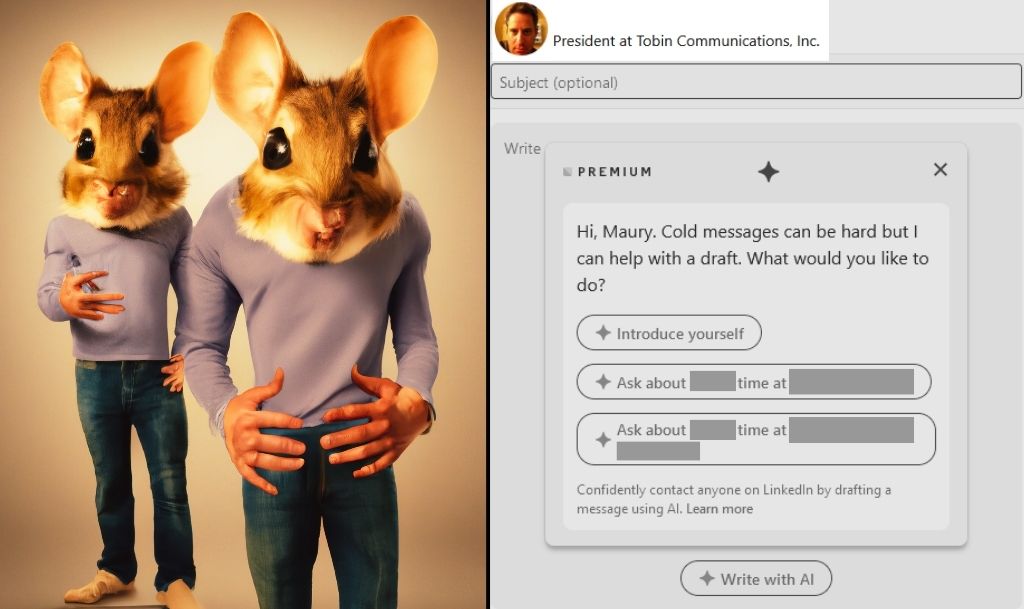
By Maury Tobin
These are challenging times, especially for those who work in strategic communications or public relations (PR), but also for the broader world and the leveraging of information.
The other morning, while I was using LinkedIn to network with a potential client, a “Write with AI” [artificial intelligence] option appeared at the bottom of my screen. The AI message said it could help introduce me to the contact and ask about his or her “time” at current and past jobs. A note on the screen said that by using the app, someone can “confidently contact anyone on LinkedIn by drafting a message.”
I was intrigued that LinkedIn said I could “confidently” use its app, so I put it to the test. The results — a few seemingly stilted paragraphs — were underwhelming and serve as a cautionary tale of where humanity and the workforce may be headed. A robust PR industry and information that isn’t highly engineered matter to the future of our society and business economics.
I understand the appeal of AI, but we are learning that it’s not a panacea. A recent robo call with an AI-produced voice of Joe Biden told Democrats to not vote in the New Hampshire primary. Tesla has faced a crisis because of its self-driving system malfunctioning and the company’s stock has dipped. Or there is this recent Business Insider headline: “Parcel delivery firm faces PR nightmare after AI-powered chatbot cusses and mocks the company.”
To be fair, when I clicked on the various message options, the content generated by the app was structurally sound and the language was grammatically correct. But it lacked depth and the human touch. The messages weren’t the kinds of things I would generally say in a conversation. For me, it was an easy decision to forgo AI and continue communicating with my contacts the way I always have.
The Human Brain Has a Motherlode of Sensory Neurons
AI certainly will help people in a lot of professions, but fostering personal connections and communicating well are paramount in PR. Authenticity and having a voice in your writing lead to effective and tailored communications, and passionate storytelling. These things impact success.
AI could have tremendous utility in aggregating information and data and helping assess messaging and content. For instance, humans who can manage timely events, decipher what opinion giants and stakeholders believe, and make smart decisions are needed in a crisis.
But one of the chief complaints about using AI for content creation is that the copy and information can be wrong, as Forbes has underscored.
Multiple cases stemming from intellectual property laws have been filed that will test AI apps such as ChatGPT, which uses online content to train its OpenAI product.
AI: A Tool Still in Test Mode
There’s no question that PR people are lauding AI because the reality is that strategic communicators are always looking for ways to save time and move quickly. They also like anything that frames PR as not just an art, but also systems and methodologies with known efficacy.
Business people are excited about AI — for instance, natural language processing (NLP), which is a branch focused on how computers can process language like humans do, according to the Harvard Business Review. And there are AI tools such as machine learning algorithms which allow for data to recognize patterns and formulate hypotheses by computers that have been trained, according to Data Science Central.
Yes, the promise of AI is expansive, from writing press releases, copy for social media, or white papers, to front loading planning and measuring success. But because AI is such an exploding area, it’s too early to extrapolate how PR agencies and their clients will be best served by it.
I’m very skeptical about the day when PR campaigns are created mainly by AI because I don’t think we can forget that PR, truly, is people relations.
When clients hire my firm, Tobin Communications, Inc., a PR agency I founded in 1996 that provides a broad range of communications, strategic counsel, grassroots, and public affairs expertise, they are chiefly relying on our abilities to dig deep and learn about their organizations, issues and goals.
AI Can Never Replace the Strength of Executive Oversight
Good PR firms innately work hard to act collaboratively to help clients connect to their important audiences on a personal level.
PR professionals must be creators, not button pushers, whether it’s for an issue or identity campaign, outreach to a trade group’s members, marketing or branding for a public awareness initiative, or media relations for new medical treatments and technologies.
Clients’ primary audiences and customers are assets who should not be treated like they are replaceable, which means we can’t condense PR or merchandise it like it’s a product in a box.
Every two to three years, a new trend tries to bark at the PR industry and, clearly, AI is that new mastiff at the dog park.
AI can’t be dismissed because it streamlines many business processes and it is used to crunch massive amounts of data. But in these looped systems, you can lose copyright control, images can become public domain, and others can see and use your content.
So put me down as a critic of this prolific technology when communicators lean too heavily on it and believe it can replace a person’s ability to produce written and multimedia content of any consequence.
The value of strategic communications has always been about the power of humans to understand nuance and emotional intelligence in ways that computers can’t, ultimately impacting behaviors and perceptions and helping businesses and organizations excel and grow.
Maury Tobin is the President of Tobin Communications, Inc., a firm he founded in 1996 that provides a broad range of communications and PR services. Tobin earned both a Bachelor of Arts Degree in Interdisciplinary Studies and a Master’s Degree in Public Communication at American University.
